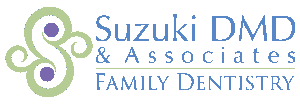Restorative Dentistry in Lodi Ca
Years of wear and tear, injury, or poor care can hurt the look and function of your teeth. Dr. Suzuki and his team change lives every day through restorative dentistry. Rejuvenate your smile today!

Dental Implants
A dental implant is one of the most permanent forms of restorative dentistry and can be used for several teeth or for a single tooth. If you are missing one or more teeth or if you wear ill-fitting dentures, dental implants can be your smile solution. We can improve your quality of life with dental implants.
As the prosthetic that most closely mimics nature’s design, dental implants serve as substitute tooth roots. Each implant is strategically placed in the jaw, where bone integrates with it to create a solid foundation for a crown, bridge, or denture. Your dentist in Lodi CA – Dr Suzuki will craft a custom prosthetic tooth that looks and feels completely natural, and with proper care, your dental implants can last a lifetime.
Benefits of dental implants:
– Promote bone retention
– Eliminate slipping, loose, wobbly dentures
– Don’t require support from healthy teeth
– Can last a lifetime
– Look, feel, and function like natural teeth

Implant-Supported Dentures
While typical dentures shift and require the use of denture adhesives to keep them in place, implants fit solidly, reducing the problems associated with traditional dentures, such as gum sores and difficulty speaking and chewing. Implant-supported dentures distribute your biting pressure more like natural teeth than traditional dentures, stimulating the supportive structures of your teeth and preventing the bone and soft tissues from shrinking away. You can replace an entire set of teeth with beautiful, natural-looking implants.
Dentures
A properly fitting denture is very important. A good fit ensures that your dentures will allow you to retain much of your mouth’s function, which is important for maintaining natural muscle tone in your face and jaw. Dentures will keep you looking and feeling healthy and will help you retain a natural lifestyle. A beautiful smile and the best possible fit ― two of the primary goals Dr. Suzuki will achieve if you need dentures to restore your smile.
Partial Dentures
Partial dentures are used if you have several teeth missing that cannot be corrected with a bridge. A partial denture is created to replace those teeth. The partial denture is removable and is designed to fit comfortably and to blend in with any remaining teeth. This type of denture is made from a synthetic material that is supported with a lightweight metal. It mimics your gum tissue and teeth to create a natural looking smile, while still remaining functional. The partial is important once the teeth have been removed in order to preserve the bone and to keep existing teeth from tilting and growing in toward the gaps.
Crowns
You can erase years of wear and tear with crowns. Your dentist uses a tooth-like crown made of precious metals or tooth-like porcelain to restore your tooth after the decay has been removed. Crowns are also used to restore chipped teeth, broken teeth, gaps in teeth, and other damage. Also called “caps,” porcelain crowns mimic natural-looking teeth in both shape and color.
Bridges
Gum disease, injury, decay, or wear and tear can contribute to the loss of a tooth, which can create problems for your dental health if not corrected. Gradually, your bite pressure may shift to other parts of your mouth to compensate for an inability to efficiently chew in the area of the missing tooth. Neighboring teeth may begin to move into the gap, resulting in discomfort, pain, and more future problems. Your dentist creates a functional, life-like bridge to correct your smile, to restore your bite, and to alleviate your discomfort. A bridge is meant to “bridge the gap” in your smile in order to prevent any further damage. After some preparation of the two neighboring teeth, crowns are created for them. A prosthetic tooth (or pontic) is fused between the crowns.

Inlays/Onlays
Sometimes effectively removing tooth decay requires the removal of a portion of your tooth. The removed portion is then replaced with a porcelain inlay or onlay. Dr. Suzuki customizes an inlay or onlay to fill the space left behind when part of your tooth is removed. Traditionally, inlays and onlays were made out of metal, much like traditional filings. However, now porcelain-milled inlays and onlays are virtually indistinguishable from natural teeth and provide relief from chewing pain, cavity pain, and tooth degeneration.

TMD
You may suffer from headaches, a popping jaw when you open or close your mouth, and pain in your jaw joints and muscles. This could signify problems with your temporomandibular joint. A healthy jaw joint does not make any noise. Clicking or popping in the joint may be an indication of strain or of long-term injury. The joint problem may be a result of trauma, of complications with your bite, or of grinding or clenching your teeth (or a combination of these factors). TMD or temporomandibular joint dysfunction, is a condition that affects many people, but the good news is that it can often be treated. Based on the severity of your condition, we can recommend a course of treatment that will help alleviate your pain, making your day-to-day activities more pleasant. If you are experiencing or have experienced clicking, popping, or pain in your jaw joint, ask us today if you might benefit from this treatment.
Sleep Apnea
Are you tired, stressed out, and moody because of interrupted sleep? Sleep apnea ― a condition in which breathing stops for periods of ten seconds or longer ― can interrupt the deep sleep that makes you feel rested.
When you stop breathing during sleep for ten or more seconds, you have “apnea.” OSA, or obstructive sleep apnea, is one type of sleep apnea. Lack of adequate breath during sleep reduces your airflow, causing your brain to tell your body to wake up and breathe. In some cases, this causes you to only move into a lighter stage of sleep, while other times, you wake completely.
Many factors may contribute to airway blockage ― from the size of passages and oral or airway structures, to the swelling of passageways or the position of the tongue. Disrupted deep sleep is dangerous and can affect your mood and your health and can cause daytime sleepiness. The added stress and fatigue can cause lack of concentration, loss of memory, and accidents in the workplace or while driving. Other health risks include high blood pressure and heart problems and even a risk of premature death. Your sleep apnea may also cause you to snore, disturbing your sleeping partner’s rest as well.
A few tests can determine whether or not you suffer from OSA, and non-surgical therapies may alleviate your problem. Some patients may now wear dental appliances that reposition the tongue or mandible (lower jawbone), such as the Silent Nite® or the Myerson EMA® appliance.
A Swedish study showed that the anterior mandibular positioning dental device (AMP) is actually more effective than surgical therapies. The same study stated that adverse health effects and appliance repairs were rare.

General Services

Technology

